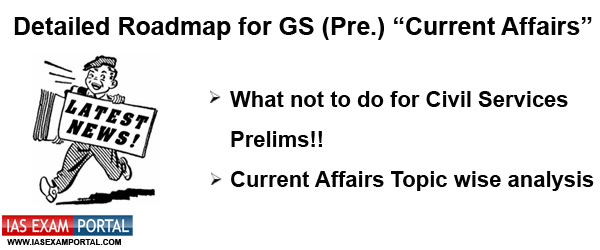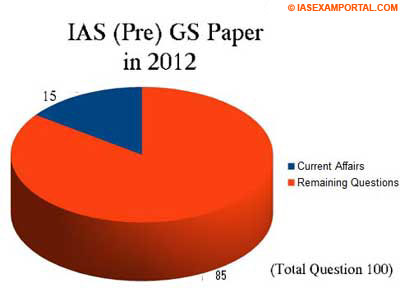(Getting Started) Detailed Roadmap for GS (Pre.) - "Current Affairs"

Detailed Roadmap for GS (Pre.) - Current Affairs
In the preceding article, we discussed the significance and strategy for Environment, General Science and Climate Change. This, final article about the General Studies paper of the Prelims deals with the Current Affairs section.
There is a lot of hue and cry about the significance of the current affiars in the IAS (Pre) GS exam. However, it is important to note that the study of current affairs and general knowledge should be done judiciously, so as to save one’s time and effort.
The recent analysis of the IAS Prelims have suggested that- a lesser number of questions are being asked from the current affairs section, as compared to the previous years question papers. There has been a change in the approach of the UPSC.

Now, the issues of current affairs are being asked in the context of the theoretical issues. Thus, it becomes important to know about the concept first. Many-a-times, one is able to answer a question on current affairs, even if one is not aware of the event itself. This is only due to your conceptual clarity, which helps you in logically deducing the answer.
However, quite recently, the UPSC has been asking questions based on the application of the theory and concepts. Thus, it has become important to know about the current affairs.
Example:
Q. Which one of the following statements is correct? (GS Pre. 2013)
(i) In India, the same person cannot be appointed as Governor for two or more
states at the same time.
(ii) The judges of the High Court of the states in India are appointed by the
Governor of the states just as the judges of the Supreme Court are appointed by
the President.
(iii) No procedure has been laid in the constitution of india for the removal of
the Governor from his/her post.
(iv) In the case of a Union Territory having a legislative setup, the Chief
Minister is appointed by the Lt. Governor on the basis of majority support.
Ans. (iii)
Thus, remember to study the current affairs, as it is very important from an exam point of view. However, you must link the study of current affairs with the basics. It is hard to mug up everything available in the dailies and internet, till the exam. Thus, linking the different topics to the things you study helps in remembering the concepts and current events both. Read how to study for current affairs.
To save your effort and time, you might choose to read The GIST, which provides you with the important articles and events from the Hindu, Kurukshetra, Yojana, Science Reporter and PIB. You may also choose to read the Weekly Current Affairs to keep yourself up-to-date with the current affairs of India and the World. But, if you have sufficient time with you, it is best to read the original sources
This concludes our analysis of the GS paper of the IAS (Pre). Our further articles would discuss the nature of the Paper II of the IAS (Pre), and the right strategy to be followed to deal with it.
In the meanwhile, please feel free to contact our team for any support and guidance.
We wish the candidates, All the Best!!
Team IASEXAMPORTAL

